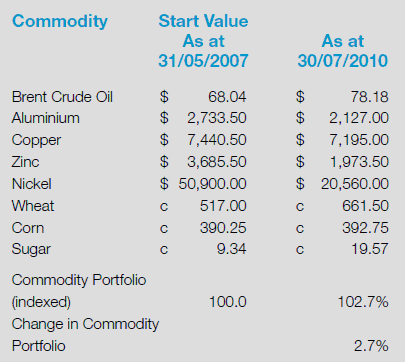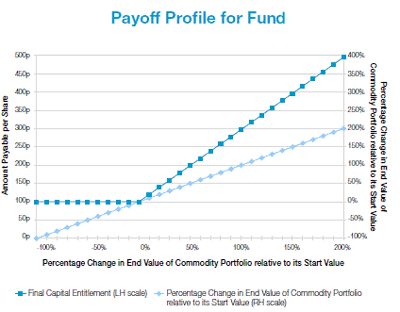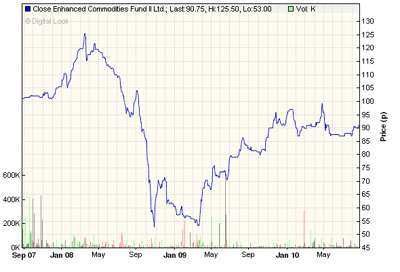How to kill two birds with one great stock
Demand for commodities in emerging markets could easily stoke inflation in the West, says Bengt Saelensminde. Here, he picks one fund that should insulate you against rising commodity prices while giving you all the security of a bond.
Get the latest financial news, insights and expert analysis from our award-winning MoneyWeek team, to help you understand what really matters when it comes to your finances.
You are now subscribed
Your newsletter sign-up was successful
Want to add more newsletters?

Twice daily
MoneyWeek
Get the latest financial news, insights and expert analysis from our award-winning MoneyWeek team, to help you understand what really matters when it comes to your finances.

Four times a week
Look After My Bills
Sign up to our free money-saving newsletter, filled with the latest news and expert advice to help you find the best tips and deals for managing your bills. Start saving today!
This was a headline in Monday's Telegraph: 'Mortgage rates may climb to 14 per cent within two years'. Now, I'm always saying that financial markets can turn suddenly. But this headline strikes me as blatant scaremongering.
The story's based on a report by The Policy Exchange think tank saying that base rates could go back up to 8% in the next couple of years. Then a personal finance website (Moneyfacts) took another great leap and suggested that if rates go to 8%, then mortgages could go to 14%! But it would be suicide for the Bank of England to jack rates up to 8% now. Personal and business bankruptcies would make the credit crunch of 2008 look like a walk in the park.
As the bond markets have been pointing out for months, the economic recovery is looking very soft. And the harsh reality is that interest rates are going to stay in lock down for some time. That means you might continue to earn a measly amount of interest on your bank balance over the next few years. But that's not your only problem.
MoneyWeek
Subscribe to MoneyWeek today and get your first six magazine issues absolutely FREE

Sign up to Money Morning
Don't miss the latest investment and personal finances news, market analysis, plus money-saving tips with our free twice-daily newsletter
Don't miss the latest investment and personal finances news, market analysis, plus money-saving tips with our free twice-daily newsletter
How China could damage your bank balance.
Because there is another threat to your bank balance - commodity stoked inflation. Money is heading east and as it does, it's getting funnelled into commodities as these economies build infrastructure and consumption rises.
And while I think deflating assets prices are the biggest immediate threat to your wealth, the rising price of commodities from emerging markets could stoke inflation here - and relieve you of a serious chunk of your wealth in the process. Rising food prices, rising fuel prices -the emerging markets are grabbing an ever increasing share of global resources. And I just can't see this reversing any time soon.
So how to protect yourself? Well there is one very interesting solution. A stock that has the benefits of a bond (low rates make bonds more valuable) and which pays you twice the inflation on commodities.
How to kill two birds with one great stock
In April, I tipped the Close Brothers Enhanced Commodities trust as a play on inflating global commodities in a low interest rate environment. Let me run through the idea again to remind you.
The investment trust was launched in 2007 at £1.00 and is expected to be redeemed at £1.00 in June 2013. It trades in London (LSE: CED2) and costs 93p (price as of 25th August 2010). Effectively, it'll pay out 7.5% (7/93) over three years. Not very exciting, but then again, it's broadly similar to what you'll get in the bank.
Also bear in mind, you'll get the interest as a capital gain, so if you stay under your CGT threshold, it's effectively tax free.
And then there's the commodities bit.

- Discover how to profit from oil without ever owning a single barrel
- Why NOW is the best time to put a few carefully selected oil investments into your portfolio
The fund has taken out contracts with third parties that will pay double the rate of inflation on a selected group of commodities.
The table shows the commodities that the fund has exposure to, and how they've performed to the end of July relative to the base date (Start Value):

Source: Close Enhanced Commodities Factsheet
So with the commodities portfolio up 2.7%, investors will get approximately £1.05 back at redemption if everything stays the same. That is £1.00 from the bond and 5p (2 x 2.7 = 5.4, rounded down to 5p) from the commodities exposure.
Here's a graph that shows how the payout changes depending on what happens to the commodities prices:

Source: Close Enhanced Commodities Factsheet
The line at the bottom shows different scenarios for the commodities, from a 100% loss, to a 200% gain. But the interesting line is the dark blue line on top. The far left-hand side shows that the downside is capped. You'll get the £1 back whatever happens. And if global inflation continues to drive up commodities, you'll get double the increase (plus your £1 back too).
A few risks to consider
You'll probably have noticed that 'soft commodities' such as sugar, corn and wheat have been moving up recently. That's been mainly down to short-term factors as world wheat harvests have been hit. This could quickly reverse. But remember, much of this rise was during August and hasn't shown up in the valuation yet. We'll have to wait until the beginning of September for the next valuation -that could prove interesting!
When the fund launched three years ago, it bought £45 million of bonds that mature in 2013. That's what's going to fund the redemption. The bonds are investment grade, but that doesn't mean that the bond provider can't go bust, leaving the fund unable to make the full redemption of £1 per share. Unlike savings in the bank, as this is a stock, you won't be covered by the Financial Services Compensation Scheme.
On top of that, the parties that have taken the other side of the commodities bet could also go bust.
And like the snow is to our rail operators, so inflation could hurt us if we suffer 'the wrong sort of inflation'. Inflation brought about by a general uplift in prices and wage demands, could push rates up. This will make the 7.5% return on the bond less attractive. We'd then be reliant on commodities to bolster returns.
Here's how the trust's shares have performed since it was launched in 2007:

Share performance since launch (September 2007): | 2007 +2.16% | 2008 -42.65% | 2009 +55.37% | 2010 -4.47%
This article was first published on 25th August in the free investment email The Right side. Sign up to TheRightSide here.
Your capital is at risk when you invest in shares - you can lose some or all of your money, so never risk more than you can afford to lose. Always seek personal advice if you are unsure about the suitability of any investment. Past performance and forecasts are not reliable indicators of future results. Commissions, fees and other charges can reduce returns from investments. Profits from share dealing are a form of income and subject to taxation. Tax treatment depends on individual circumstances and may be subject to change in the future. Please note that there will be no follow up to recommendations in The Right Side.
Managing Editor: Theo Casey. The Right Side is issued by MoneyWeek Ltd. MoneyWeek Ltd is authorised and regulated by the Financial Services Authority. FSA No 509798. https://www.fsa.gov.uk/register/home.do
Get the latest financial news, insights and expert analysis from our award-winning MoneyWeek team, to help you understand what really matters when it comes to your finances.
Bengt graduated from Reading University in 1994 and followed up with a master's degree in business economics.
He started stock market investing at the age of 13, and this eventually led to a job in the City of London in 1995. He started on a bond desk at Cantor Fitzgerald and ended up running a desk at stockbroker's Cazenove.
Bengt left the City in 2000 to start up his own import and beauty products business which he still runs today.
-
 Should you buy an active ETF?
Should you buy an active ETF?ETFs are often mischaracterised as passive products, but they can be a convenient way to add active management to your portfolio
-
 Power up your pension before 5 April – easy ways to save before the tax year end
Power up your pension before 5 April – easy ways to save before the tax year endWith the end of the tax year looming, pension savers currently have a window to review and maximise what’s going into their retirement funds – we look at how